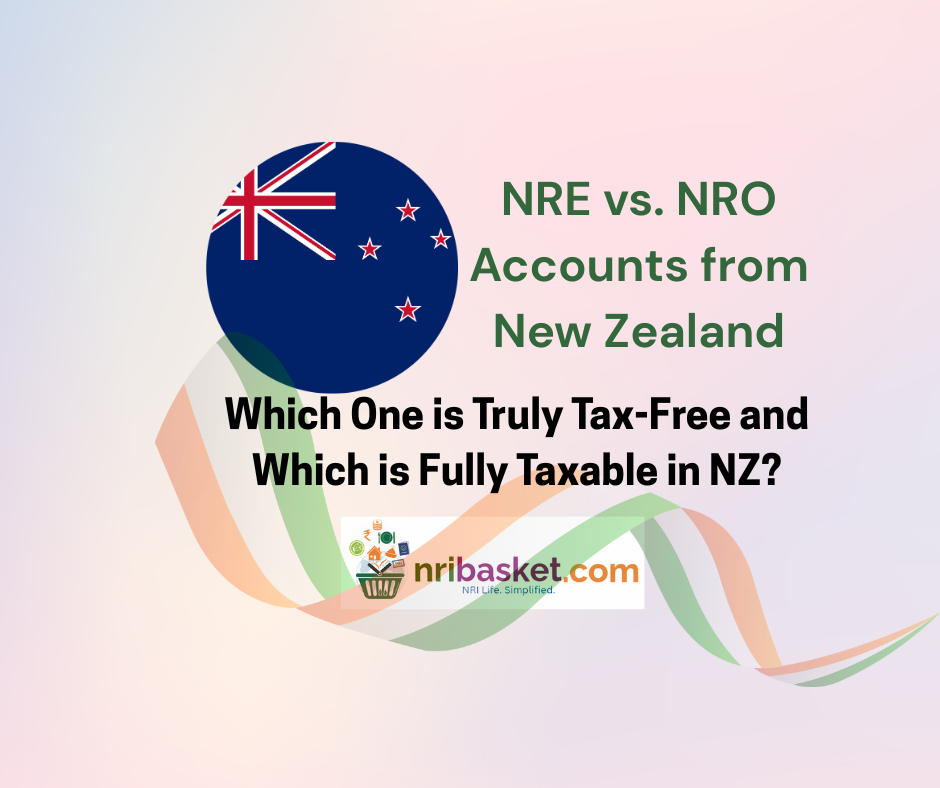
NRE vs. NRO Accounts from New Zealand
Details: The NRE account is meant to hold funds brought in from outside India (i.e. foreign income), converted into Indian rupees.The NRO account handles money earned in India (e.g. rent, pension, interest from Indian sources).You can remit funds from NRE more freely abroad; NRO has stricter repatriation rules.In India, interest on NRE is tax-exempt; interest on NRO is taxable.
Wise
Details:In India, interest on NRE is tax-exempt under Indian laws, while interest from NRO is subject to Indian tax.But as a tax resident of New Zealand, you’re taxed on your worldwide income (including interest from India) unless there’s a specific exemption or treaty relief.
Inland Revenue.So even though NRE might be “tax-free in India”, NZ may still tax the interest unless relief or exemption applies.
Details:As a NZ tax resident, you’re obligated to report all overseas income including interest earned abroad.That said, there is a “temporary tax exemption” period for new migrants (or persons returning) under certain conditions, which might exempt foreign-sourced income for a limited time.
You may claim a foreign tax credit if some tax was already paid in India to reduce NZ liability (depending on treaty and domestic law).
NZ has a tax regime where, as a resident, you are taxed on your worldwide income (including interest from foreign accounts) even if you don’t bring that money into NZ.The payer (in India) may withhold tax (under Indian law) before paying interest on NRO. That reduces the net interest you receive.
In NZ, there is no automatic NZ withholding on overseas interest (NZ doesn’t typically withhold tax on amounts sent from overseas accounts to you), but you must include it in your IR3 return as part of your taxable income.
Details:Under Indian Income Tax Act (Section 10(4)), interest earned in NRE accounts (savings or fixed deposits) is exempt from Indian income tax for NRIs.Meanwhile, interest on NRO accounts is taxable in India, with Tax Deducted at Source (TDS) applying.However, “tax-free” in India does not immunize it from taxation in your country of residence (e.g. NZ).
Yes, generally interest from NRO accounts is taxable in India with TDS.
Details:Banks deduct TDS (Tax Deducted at Source) on interest earned in NRO accounts before crediting the deposit account.The rate and procedure vary depending on Indian tax rules and whether the NRI has submitted correct documentation (PAN, etc.).You can often claim a deduction or credit in India if your overall income means your actual tax liability is lower, but TDS is a default mechanism.
In NZ, when you report the foreign interest, you may claim a foreign tax credit for tax already paid in India (subject to rules) to avoid double taxation.
You must check the specific provisions in the India–New Zealand DTA and whether India withholds at a reduced DTA rate or full domestic rate.
Details:As a NZ tax resident, you must include all global income (including interest from Indian sources).Your Indian tax withheld (by TDS) can reduce NZ tax via a foreign tax credit, but you cannot fully avoid NZ tax unless an exemption or special rule applies.If you are in the temporary exemption period (for new migrants), certain foreign income may be exempt for a time — but interest from NRO may or may not qualify; detailed rule check is needed.
New migrants (or returning NZers) may get a 4-year exemption from tax on most foreign-sourced income.
Details:Under NZ tax rules, new residents or returnees may qualify for a 4-year exemption on foreign-sourced income (not including employment income) to encourage relocation.
hat means, for up to four years, interest from NRE/NRO might not need to be reported (depending on the rules).However, interest from Indian sources (NRO) may not always be treated as “foreign-sourced” for the exemption, depending on the detailed definition and whether Indian source income is excluded from the exemption regime.It’s critical to check NZ’s tax rules and any IRD guidance.
Details:NZ uses a progressive tax rate system. The interest income gets added to your total income (unless exempt), and taxed at your marginal rate.The applicable rate could be 10.5%, 17.5%, 30%, 33% or 39% depending on your income bracket.
If tax was withheld in India (e.g. TDS on NRO interest), you may reduce your NZ tax liability through a foreign tax credit, but you still may owe the difference.
The credit is limited to the lesser of the foreign tax paid or the NZ tax attributable to that foreign income.You must show proof of tax paid (e.g. TDS certificate) and apply correctly in your IR3 return.The India–NZ DTA may also set rules on how credits are applied.
Details:If India withholds more tax than the DTA allows for, you may file for refund or adjustment with Indian tax authorities.You’ll need to submit appropriate claim forms (e.g. in India, often Form 15CA / 15CB etc. if remitting, or an income tax return showing excess TDS).Documentation is critical: proof of excess withholding, identity, DTA eligibility, etc.Sometimes procedural or administrative complexities exist — you may need assistance from Indian tax/chartered accountants
Details:The entire balance in an NRE account (principal + interest) is repatriable freely without restrictions in India.In NRO, you can repatriate up to a fixed ceiling (often up to USD 1 million in a financial year, subject to documentation, tax clearance, and restrictions).You may need to submit forms (e.g. Form 15CA / 15CB in India) to comply with Indian foreign exchange and tax rules.
The remittance from NRO also may be subject to proof that taxes are paid on Indian income before conversion.
Details:With NRE, your deposit is from foreign income, and the interest is tax-free (in India).With NRO, it’s Indian income such as rent, dividends, pension, etc., so Indian tax law treats interest as taxable.NZ will view both as foreign interest income (if you’re a tax resident) and tax them accordingly, unless exemptions apply.The deposit source matters heavily for Indian tax treatment; for NZ tax, the interest itself is what’s taxed (or exempted) rather than the deposit source.
Details:New Zealand taxes based on residency, not remittance. So even if you don’t bring the money back to NZ, you still owe NZ tax on foreign interest.
This rule contrasts with some countries which use a remittance basis, but NZ is not one of them (except for certain transitional exemptions).Only in the temporary exemption period might some foreign income (if qualifying) be excluded even without remittance.
Yes — as a non-resident of NZ, you typically won’t be taxed in NZ on non-NZ-sourced income, including NRE/NRO interest.
Details:A NZ non-resident is taxed only on New Zealand–sourced income (not overseas income).
So interest earned in India (from NRE/NRO) would typically fall outside NZ’s taxable base if you are a full non-resident.However, when you change residency, you must notify IRD and check transitional rules.
Also, India’s tax obligations on NRE/NRO (Indian side) remain unaffected by your NZ residency status.
Yes — failure to declare income may lead to penalties, interest, or audits.
Details:Non-reporting or understatement of foreign income violates NZ tax rules. The IRD can impose penalties, late interest charges, and require amended returns.Disclosure of foreign income is mandatory in the IR3 return.The severity depends on how much was omitted, whether it was deliberate, and the time period involved.Always better to declare and seek credits or exemptions rather than omit.
Details:AIL (2%) is an option for non-residents receiving NZ interest from NZ payers.
Inland RevenueIt does not govern interest payments from Indian banks to NZ residents.Instead, your Indian bank will withhold tax under Indian rules (TDS for NRO). NZ then taxes you on that interest (subject to credits).
Details:The Indian Income Tax Act exempts NRE interest from tax for NRIs.Therefore, Indian tax liability on that interest is zero (subject to compliance, documentation, etc.).But again, that does not necessarily shield you from NZ tax on that interest if NZ law requires you to include it.
Details:NZ does not typically exempt small foreign interest amounts from reporting; the rule is all worldwide income is taxable (unless exempted).
f your total foreign interest is small and your marginal tax rate is low, the net tax impact could be small.If you are in the temporary exemption period, some small foreign incomes might be excluded depending on rules.Always check with IRD or a tax adviser to see if de minimis or administrative reliefs exist.
If foreign income is your only income aside NZ-sourced, the rules are simpler, but you still report.
IRD provides an Overseas Income Summary (IR1261) for breakdown.
Details:If the interest was earned under the tax-exempt regime in India (NRE), that benefit is not lost by closing the account.For NZ, the timing of income matters: you report it in the tax year in which it accrued or was received.Future interest (after closure) obviously won’t occur under NRE, but any residual interest in other accounts will follow their rules.
Details:Indian laws define tax treatment of NRE and NRO, independent of bank type (public, private, foreign).However, some banks may differ in how they apply TDS, documentation, or repatriation formalities.It might affect ease of remittance or verification, but not the core tax principle.
Details:Use NRE for income earned outside India. That gives you Indian tax exemption on interest.Use NRO for Indian income (rent, dividends, local receipts). That interest is taxable in India anyway.In NZ, both interest streams are subject to your NZ tax, unless exempt. So optimizing Indian tax (via NRE) may help reduce the net interest taxed in NZ.Also keep careful records so you can claim foreign tax credits correctly.
Certificates of TDS (Indian tax deducted).
Any documentation of foreign tax paid, remittance proofs.
Copies of Indian tax returns if filed.
Evidence of account type (NRE vs NRO).
This documentation supports any foreign tax credit and defends your position in audit.
Details:When you report interest in NZ, you convert the foreign currency amount to NZ dollars using the exchange rate applicable (e.g. on the date of receipt or an average rate).
Gains or losses due purely to exchange rate movements might have additional tax implications depending on NZ tax rules on foreign exchange movements.If you delay remittance, fluctuations may change the NZD equivalent of the interest.Always document the exchange rate used and source.
Details:In India, shareholder tax and dividend distribution rules may apply; NRE/NRO rules may not immunize dividends from taxation.In NZ, dividends from overseas are treated differently (may fall under Foreign Investment Fund / FIF rules, or may require you to include them under NZ’s rules).
Inland RevenueDividend withholding in India may apply before remittance.Consult the India–NZ DTA for dividend withholding rates and credit rules.
Notify IRD of the change in status.Ensure you’ve claimed any foreign tax credits or exemptions before exit.
Details:If you have tax residency or obligations in a third country, that country’s rules could affect how your NRE/NRO interest is treated.The India–NZ DTA is central here, but if you also have ties to another country, that country’s tax treaties or rules might also play a role.Watch out for any “controlled foreign corporation” or “passive foreign income” rules in your jurisdictions.
Always obtain advice for multi-jurisdictional tax situations.
Details:In India: NRE interest is exempt under Indian law; NRO interest is taxable with TDS.In New Zealand (as tax resident): You must generally include worldwide interest (including NRE/NRO interest) in your NZ tax return.The NZ tax you owe is reduced by any foreign tax paid (via foreign tax credit) and subject to DTA rules.If you qualify for NZ’s temporary exemption for foreign income, then some interest (especially from NRE) may be excluded for up to 4 years.in short: NRE is “tax-free in India” but not automatically “tax-free in NZ”; NRO is “taxable in India” and also likely taxed (net) in NZ after credit.




